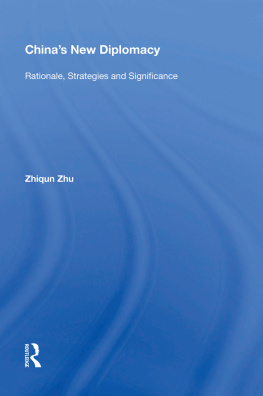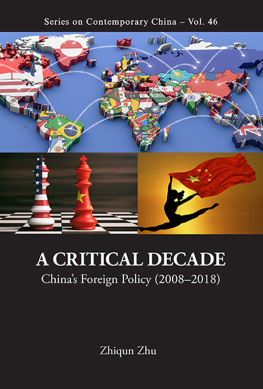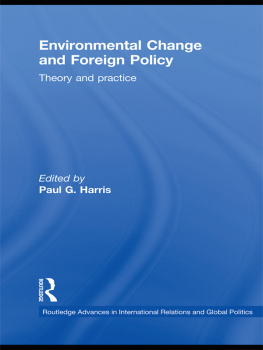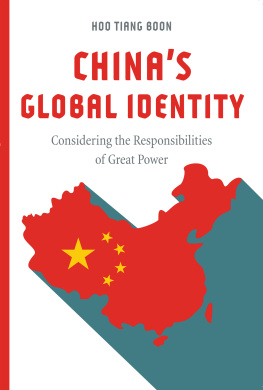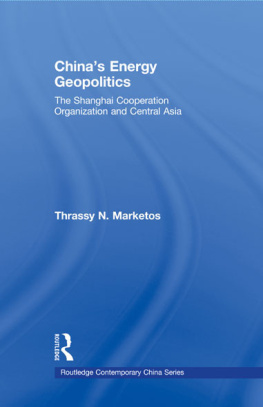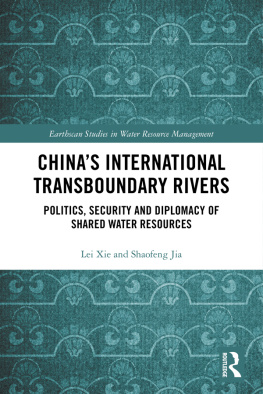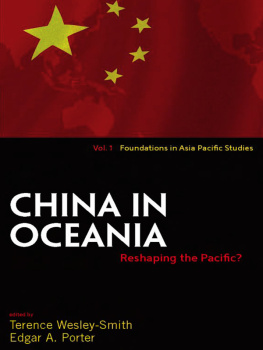CHINA'S NEW DIPLOMACY
China's New Diplomacy
Rationale, Strategies and Significance
Zhiqun Zhu
Bucknell University, USA
First published 2010 by Ashgate Publishing
Reissued 2018 by Routledge
2 Park Square, Milton Park, Abingdon, Oxon OX14 4RN
711 Third Avenue, New York, NY 10017, USA
Routledge is an imprint of the Taylor & Francis Group, an informa business
Copyright 2010 Zhiqun Zhu
Zhiqun Zhu has asserted his right under the Copyright, Designs and Patents Act, 1988, to be identified as the author of this work.
All rights reserved. No part of this book may be reprinted or reproduced or utilised in any form or by any electronic, mechanical, or other means, now known or hereafter invented, including photocopying and recording, or in any information storage or retrieval system, without permission in writing from the publishers.
Notice:
Product or corporate names may be trademarks or registered trademarks, and are used only for identification and explanation without intent to infringe.
Publisher's Note
The publisher has gone to great lengths to ensure the quality of this reprint but points out that some imperfections in the original copies may be apparent.
Disclaimer
The publisher has made every effort to trace copyright holders and welcomes correspondence from those they have been unable to contact.
ISBN 13: 978-0-815-38802-9 (hbk)
ISBN 13: 978-1-351-16184-8 (ebk)
On October 1, 2009, in a grand ceremony on the Tiananmen Square m Beijing, the People's Republic of China celebrated the 60th anniversary of its founding. By then, China had become the third largest economy (next to the United States and Japan) and the largest trading nation in the world. If one uses the calculations based on purchasing power parity (PPP), China is already the second largest economy in the world. Since China's economy is expected to continue its high growth in the coming years and the US economy is likely to grow at a very slow pace, barring major man-made or natural disasters, China's aggregate economy may be surpassing that of the United States within a couple of decades, i.e. during the lifetime of the majority of the population in today's world.
Whereas China has been generally referred to as New China since October 1, 1949, there has been no widely accepted term for China since its reform and open policies started at the end of 1978. The official term used by the Chinese authorities is a tongue-twister in itself and refers only to the beginning event of the past 30 years: "Since the third plenary session of the 11th central committee of the Communist Party of China", which was convened in the fall of 1978 in Beijing. I have coined a new term, "New New China", to refer to the post-1978 China. The towering figure of New New China is the late paramount leader Deng Xiaoping, for whom I had the great honor of working as an English interpreter in the 1980s. Deng's policy decisions, both for domestic economic and political reforms as well as for China's foreign policies, still constitute the foundation of Chinese policies today. However, with Deng Xiaoping phasing out of the public view after 1992 and with his eventual passing away in 1997. the baton was passed to the third generation of the PRC leadership headed by President Jiang Zemin and Premier Zhu Rongji, and since 2002. to the fourth generation of the PRC leadership headed by President Hu Jintao and Premier Wen Jiabao.
While the focus of China's efforts over the past 30 years has been on domestic economic reform and reconstruction, China's diplomacy has played a crucially important role in creating and maintaining an international environment and China's constructive relations with other countries as well as its position in the international order most suitable for achieving its policy priorities. China's desire for world peace is both an end in itself and a means to achieve its objective of economic development and peaceful rise in the world. Witiiout a generally peaceful and stable international order, China's economic development would have been out of the question.
Therefore, China's diplomacy and domestic economic reconstruction are very much intertwined with each other. In a sense, China's diplomacy is mandated to serve its overall economic development and its growing economic prowess has enabled China to become a more active and constructive participant in international diplomacy. Furthermore, since many hot issues in China have an important international dimension, the interrelations between major Chinese domestic affairs and China's diplomacy cannot be overemphasized. To learn about China's new diplomacy is essential in achieving a better understanding of today's world as well as today's China.
Professor Zhiqun Zhu's new book is an extremely timely and authoritative narrative and a top-notch scholarly analysis of the practices and implications of Chinese diplomacy since the early 1990s. Comprehensive in the scope of study, Professor Zhu sheds an illuminating light on the complex and multi-faceted diplomatic activities and initiatives of China and their underlying rationale and philosophy. Only a serious scholar with deep knowledge of Chinese foreign and domestic policies can produce such a profound piece.
With China fast becoming an increasingly key global player, I sincerely hope Professor Zhu's new book will help the readers to understand better what China is up to globally today as well as the future trend of China's diplomacy. Professor Zhu's well-written work is a useful handbook, a thought-provoking text, and an indispensible guide for understanding China's diplomacy.
Victor Zhikai Gao, J.D. (Yale)
Former English interpreter for Deng Xiaoping
Director, China National Association of International Studies
December 2009
Beijing, China
Many colleagues and friends have helped in the process of writing this book. I wish to express my heart-felt thanks to the following individuals in particular for their invaluable support and help: Dave Benjamin, John Doces, Doug Hecock, Wenping He, Mingjiang Li, Guoli Liu, Yawei Liu, Tony Massoud, Eduardo Daniel Oviedo, Paul Rodell, Paige Johnson Tan, Thomas Ward, and two anonymous reviewers for Ashgate Publishing. They each read part of the manuscript and offered insightful comments and suggestions, which helped to improve the quality of the book. However, they are not responsible for any errors in the book.
Victor (Zhikai) Gao (J.D., Yale), a Director of China National Association of International Studies and an International Councillor of Asia Society, graciously agreed to read the manuscript and write a foreword. Mr. Gao worked for the Chinese Foreign Ministry and the United Nations between 1983 and 1989. Most notably he was an English interpreter for the late Chinese leader Deng Xiaoping. His first-hand experience in Chinese diplomacy makes him uniquely qualified to write the foreword for this book. I'm grateful to him for his interest in my book and his endorsement of it.
In the past few years I presented earlier versions of different chapters at over half a dozen conferences and received very helpful feedback from discussants, fellow panelists and audiences, to whom I wish to extend my gratitude. These conferences include the 15th Amiual National Conference of Asian Studies Development Program in Philadelphia, Pennsylvania, March 2009; the 4th International Forum on Sinology in Lisbon, Portugal, February 2009; the 14th annual conference of the Association of Chinese Professors of Social Sciences in the United States at Cornell University in Ithaca, New York, November 2008; the 2008 annual New England Political Science Association in Providence, Rhode Island, April 2008; the International Symposium on China's Energy Strategy and Diplomacy in the Non-Western World, National Chengchi University in Taipei, Taiwan, May 2007; the 48th annual conference of the International Studies Association in Chicago, Illinois, March 2007; and the 19th amiual conference of the Association of Chinese Political Studies in Louisville, Kentucky, April 2006. In May 2009, I attended and benefited enormously from a one-day seminar on China and Africa hosted by the Jamestown Foundation in Washington, DC.

